#intersectionality with Judaism
Explore tagged Tumblr posts
Text
You are not inherently an antisemite for criticizing Netanyahu or actions of the Israeli government.
You ARE inherently an antisemite if you excuse/justify/celebrate when random Israeli civilians are murdered.
Israel contains half the world’s Jews- you can’t celebrate half the world’s Jewish population dying without being an antisemite.
Watch how some so-called “activists” react to the antisemitic DC murders. If you don’t hear Jews crying out about what happened, you either follow no Jews or only tokens.
#social justice#jewish#jew#liberal#judaism#jews#antisemitism#washington#Washington DC#antisemitic attack#Justice#progress#jumblr#jewblr#activist#activism#political#politics#intersectionality#antisemitic#antisemites#educate yourself
2K notes
·
View notes
Text
Jewish Anarchism Flag
PT: Jewish Anarchism Flag /end PT

ID: a completely black flag with in the center a white symbol composed of a circle with the Hebrew Aleph inside. The Hebrew letter Aleph consists of a diagonal line that connects two horizontal lines at the top and bottom. The upper line is slightly longer than the lower line, creating a shape that resembles a stylized X with a vertical line through the middle. END ID
Jewish anarchism: a political movement that combines elements of anarchism with Jewish thought and culture. It advocates for a society without hierarchical structures or centralized authority, emphasizing individual freedom, mutual aid, and community cooperation. Jewish anarchists often draw on Jewish traditions, texts, and values to support their beliefs in social justice, equality, and critique of oppressive systems.
No know creator for the design since it is a widely used one since years.
Edited 30 to correct wrong credits.
#Jewish#Judaism#ethnoreligious group#political movement#anarchy#anarchist#anarchism#anarchopunk#Jewish anarchism#anarcho Judaism#combo flag#intersectionality#cultural identity#bipoc#indiqueer#Jewblr#ethnoracialized group#Jumblr
16 notes
·
View notes
Text
#jews#judaism#antisemitism#leftist antisemitism#lgbt jews#lgbt community#lgbt issues#intersectionality#jumblr
8 notes
·
View notes
Text
theyre gorgeous omg thank u so much for making these /very positive connotation
Jewish Disability Pride Icons
Happy disability pride/wrath month, here’s some icons I made using the disabled sun symbol (<- link to tumblr post about it)!
Feel free to use these however you want, as long as you are being respectful! Credit is always appreciated but not required. Goyim, abled people, queer allies, etc are welcome to interact. If you are antisemitic on this post I will block you.
If you would like a different flag, different saturations, etc feel free to ask (politely!)
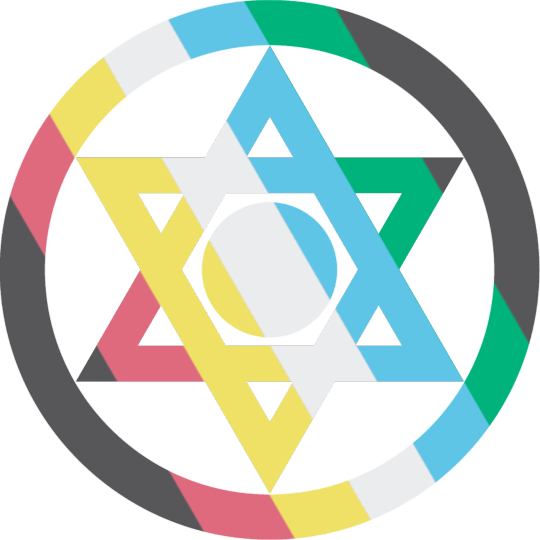
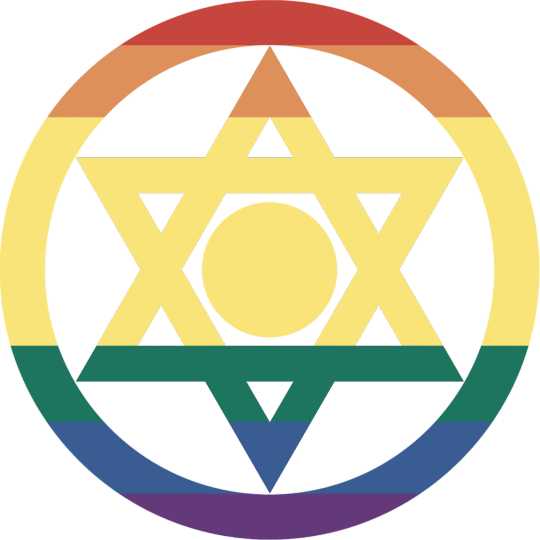
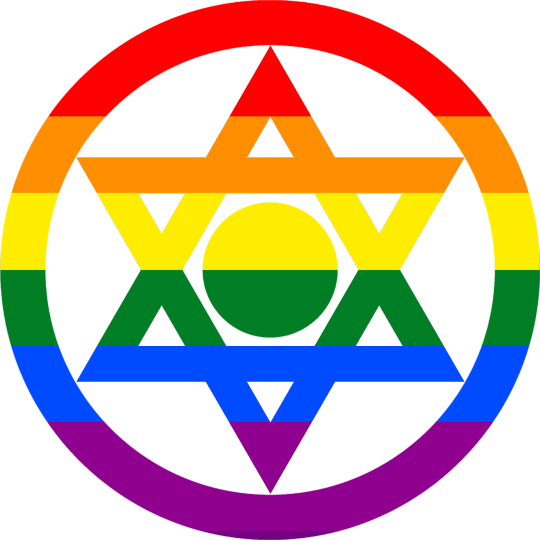
Disability Pride Flag ~ Gay Pride + Hostages Yellow Stripe ~ Gay Pride
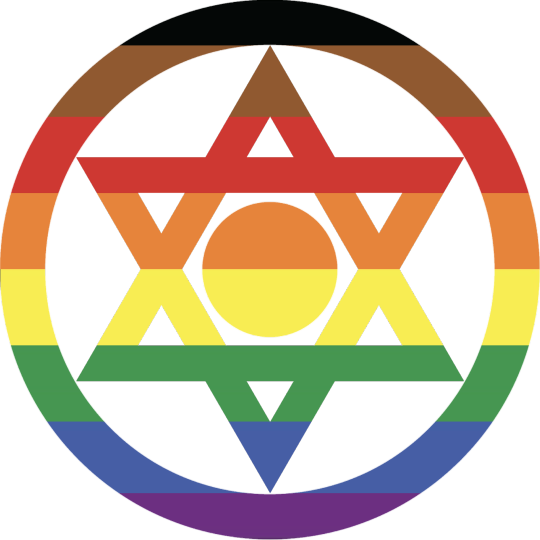
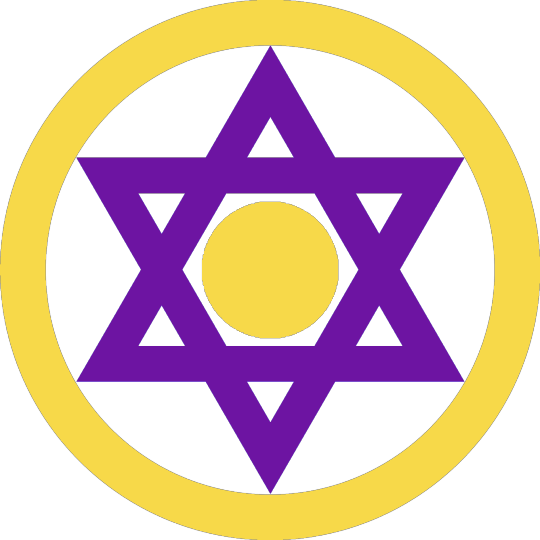
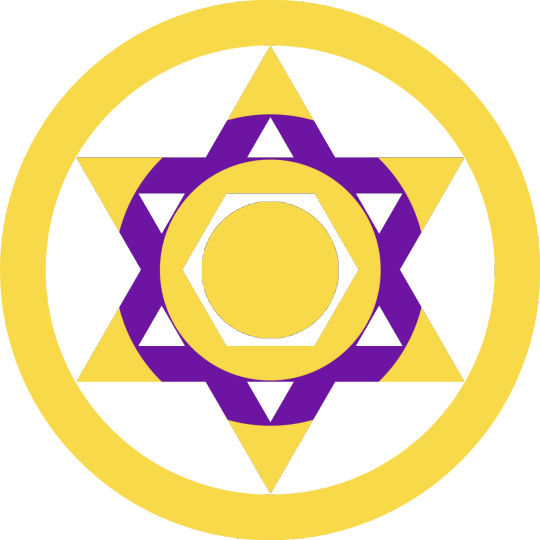
Philadelphia Pride Flag ~ Intersex (Ver. 1) ~ Intersex (Ver. 2)
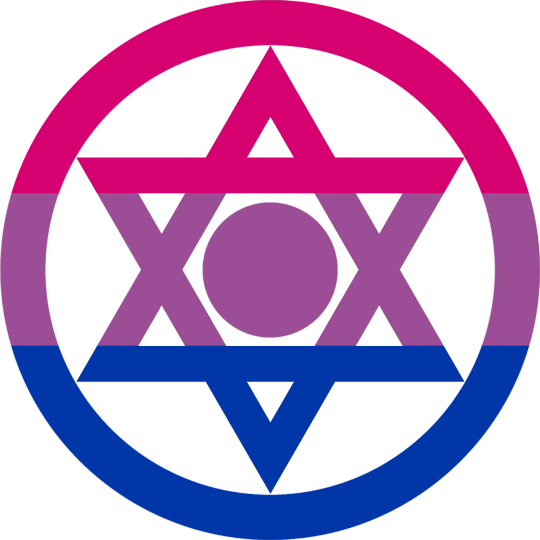
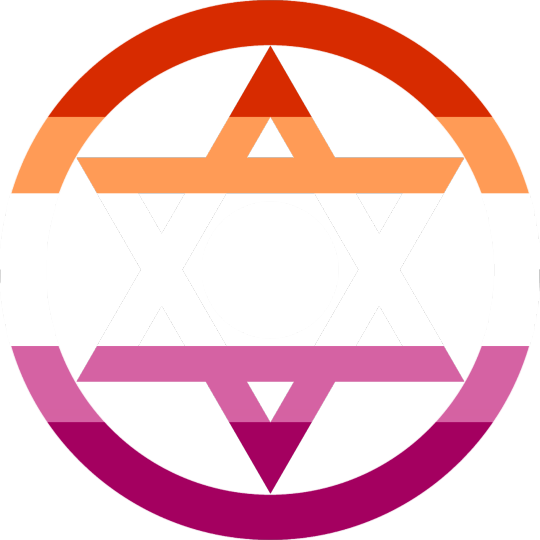
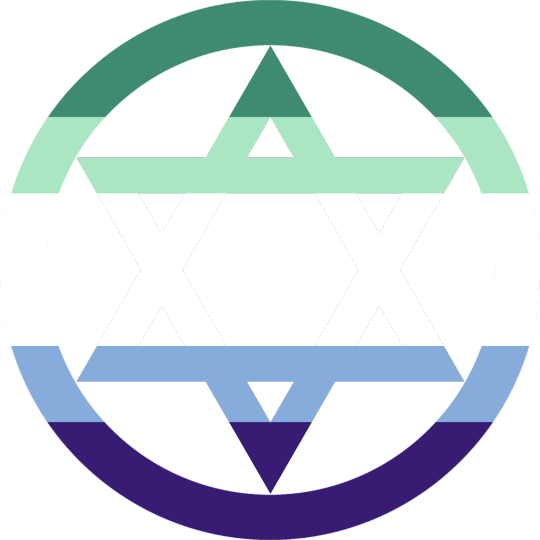
Bisexual ~ Lesbian ~ MLM

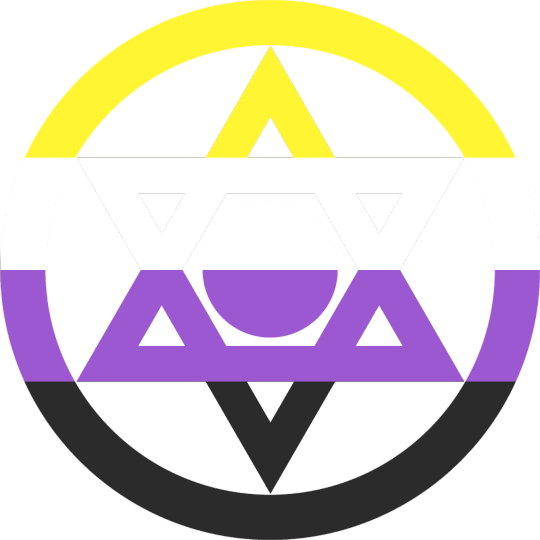
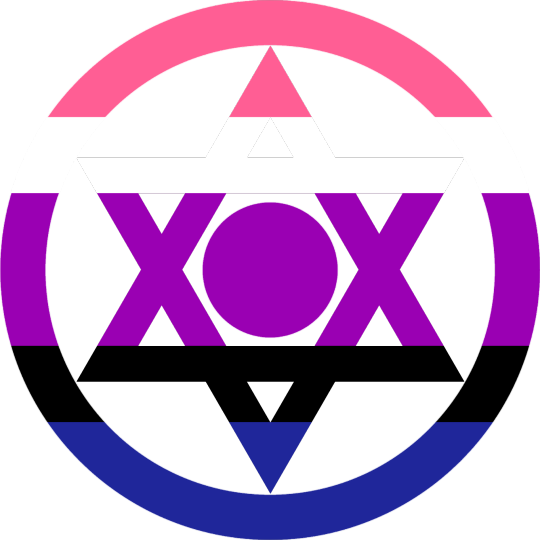
Transgender ~ Nonbinary ~ Genderfluid
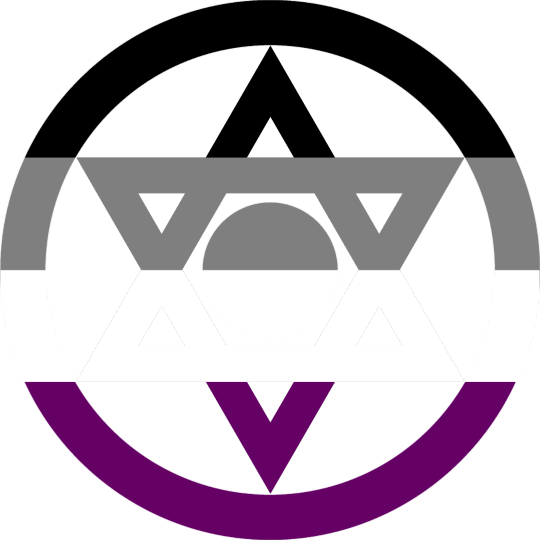
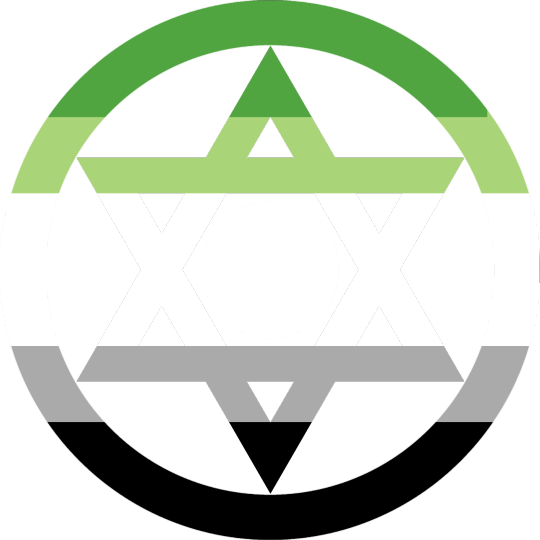
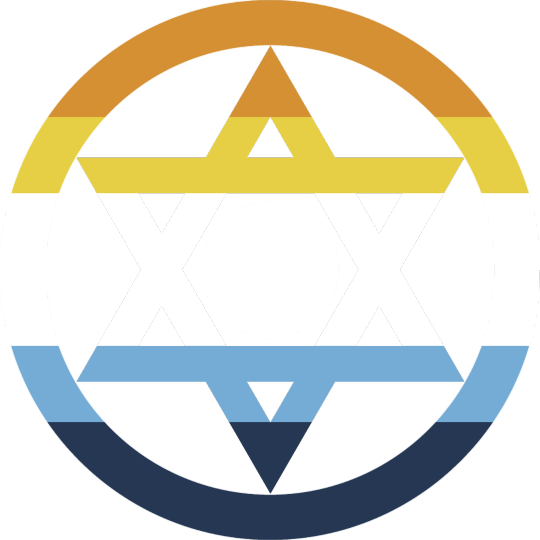
Asexual ~ Aromantic ~ Aroace



Demisexual ~ Demiromantic ~ Grey Ace
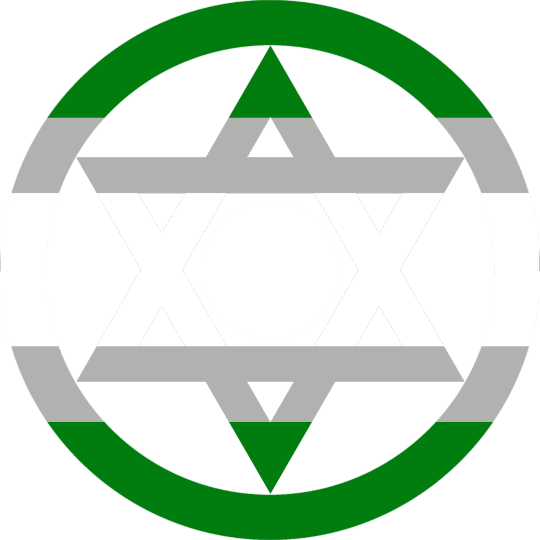
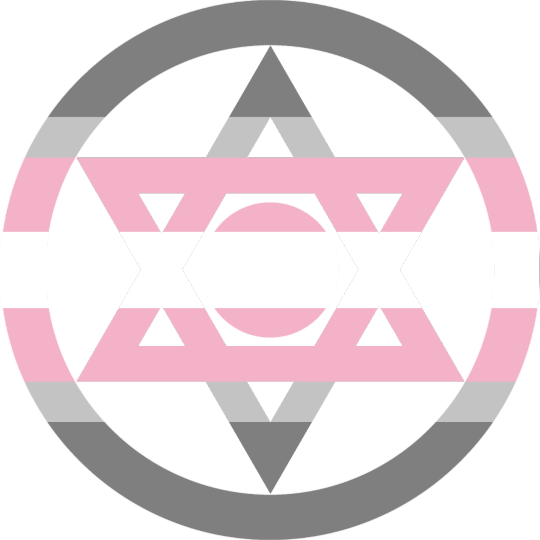
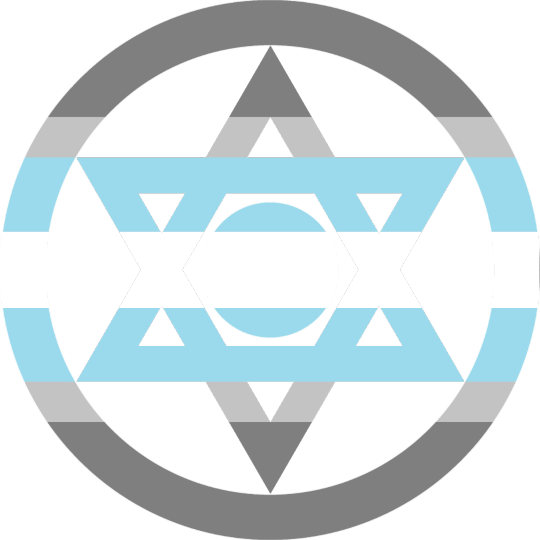
Grey Aro ~ Demigirl ~ Demiboy
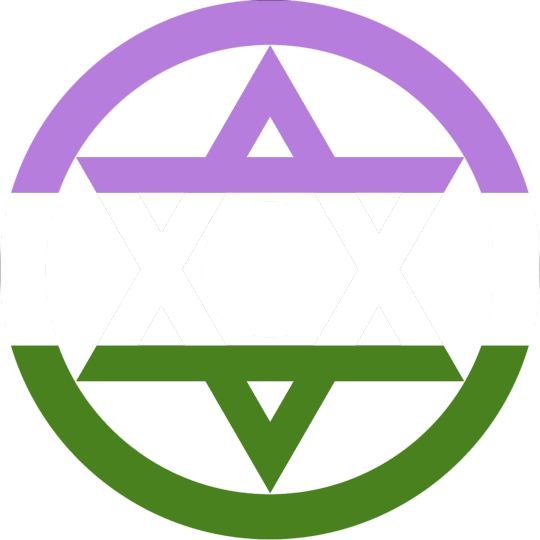
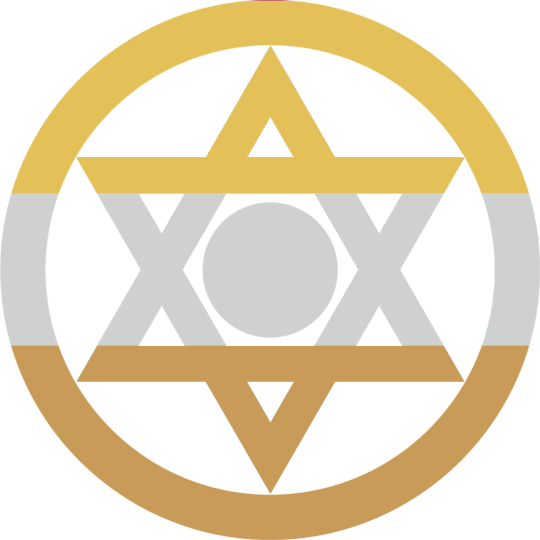
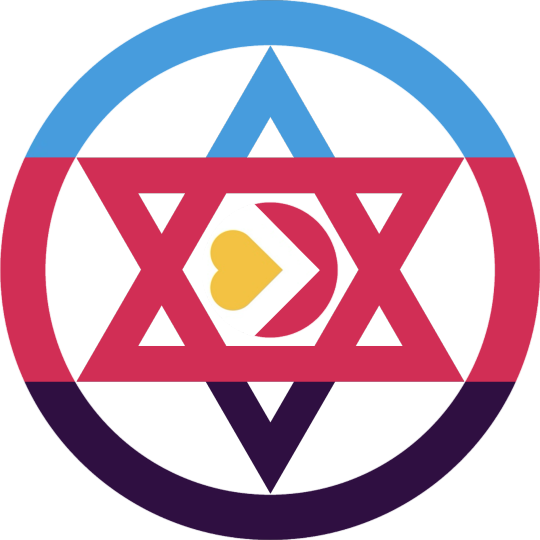
Genderqueer ~ Overcoming / Disabled Rights Flag ~ Poly pride flag
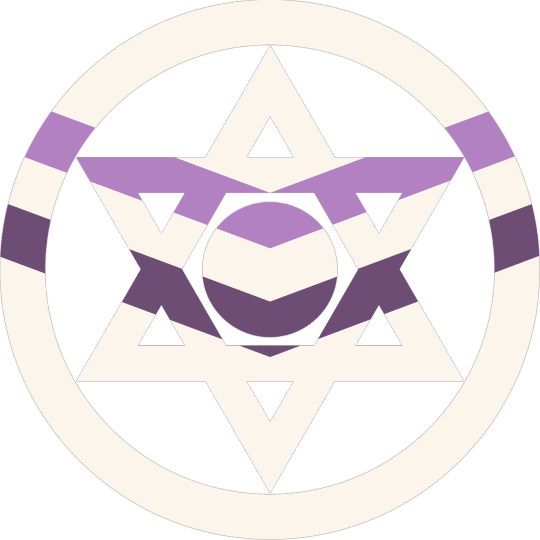
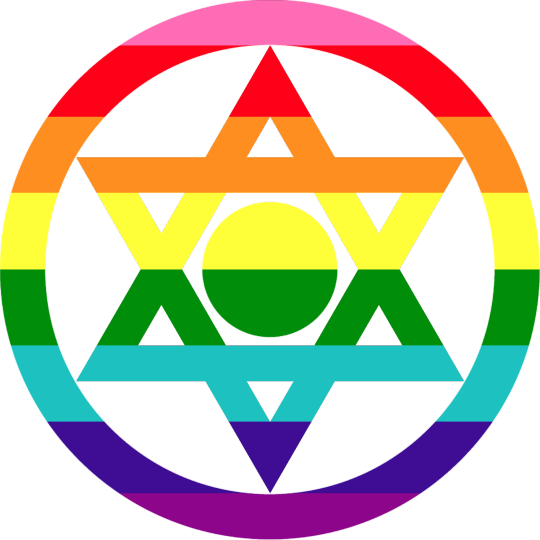
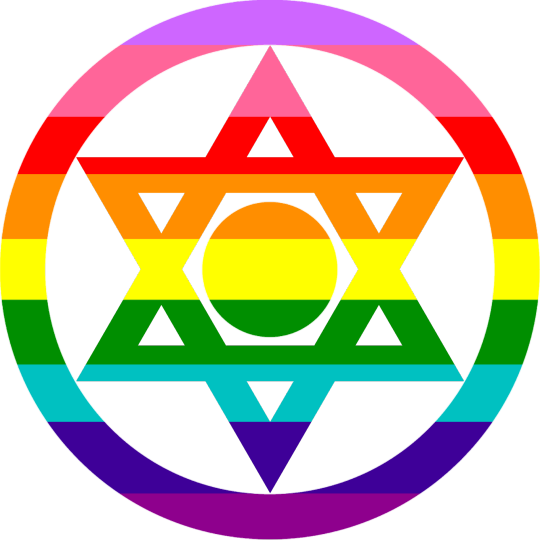
Queer ~ 8 stripe Gilbert Baker ~ 9 Stripe Gilbert Baker
+ some versions of the bi, demi, and ace flags with the shades of purple swapped:

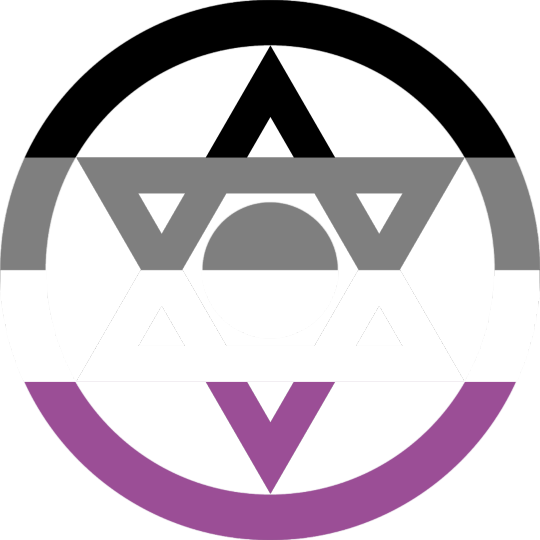

#jewish pride#jumblr#jewblr#jewish#jew#queer#disability pride#intersectionality#judaism#ethnoreligious group#disability rights#combo#intersex#bi#pan#lesbian#gay#trans#non binary#aromantic#asexual#greysexual#greyromantic#genderqueer#genderfluid#cultural identity#bipoc#indiqueer#ethnoracial group#ethnicity
319 notes
·
View notes
Text
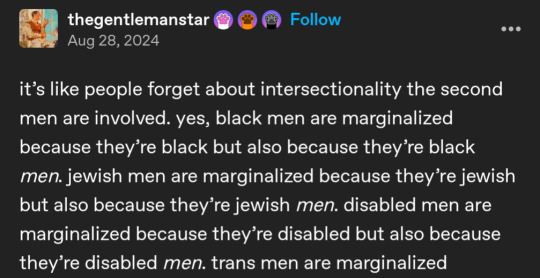
There is a longer comment thread about how this gets intersectionality exactly backwards, especially with regards to black men, but I want to derail here and just ask how about how -- in the framework of the original argument -- I am intersectionally discriminated against because of being a Jewish man versus just being Jewish? Masculinity as it's constructed in modern, western societies is rigid and brittle. Any deviation is seen as feminine and therefore unacceptable because masculinity largely defines itself based on an absence of femininity rather than a presence of masculine traits. But how does being Jewish enter into that? Judaism allows for an alternative paradigm of masculinity because it has ethics and mores distinct from western masculinity, which seems rather wrapped up in Christian conceptions of sin and salvation as well as a strict binary dualism between man and woman, between the mundane and the divine and between heaven and hell.
Beyond the theoretical framework just not really holding up overall, this particular example is puzzling me.
22 notes
·
View notes
Note
Shabbat Shalom! One of your asks came up on my explore and you mentioned that you'd like to talk about jewish books! Sorry if you've mentioned before, but do you have a recommendation/must-read list? I'm trying to connect more :)
Shavua tov! I definitely have recommendations*! (Links are either Amazon or some other site where the book can be found. These are not affiliate links and I make no money off of them)
- Essential Judaism by George Robinson is a definite must. There's an updated edition that came out in 2016 that I would say spend the money on because it includes more contemporary issues.
- Open Judaism: A Guide for Believers, Agnostics, and Atheists by Rabbi Barry Schwartz. It's a great way to compare and see where the various Jewish movements stand on the big Jewish issues without the vitrol that we often see (either on Tumblr or irl).
- Jewish Law as a Journey by Rabbi David Silverstein. It's an Orthodox perspective on developing observance, but not in the "it's all or nothing" mentality that I've seen in other books. It's pretty gendered (assumes the reader is male), but if you're into egalitarianism or part of an egalitarian movement, you can still adapt the words to fit non-male genders.
- The Observant Life (Conservative/Masorti Movement). The dust jacket calls the book "the wisdom of Conservative Judaism for contemporary Jews." It's...not that far off tbh. It has a good balance of "this is how you do x, y, and z and why you should do them."
- God of Becoming and Relationship: The Dynamic Nature of Process Theology by Rabbi Dr. Bradley Shavit Artson. I don't know where your personal theology and beliefs stand, but I still think this is a good book to read because it can enhance one's personal theology. It's also an easier read than Martin Buber's I and Thou.
- Jewish Pride by Ben Freeman (not to be confused with the book of the same name written by the guy who was a main funder of Birthright before he died). It talks about intersectionality, Jewish identity, and antisemitism and how to navigate the former two in the face of unprecedented levels of antisemitism. I think it makes a good Shabbos read if you're in a particularly contemplative mood.
Let me know if you want more book recs or if there's a specific niche you want me to cover as well.
Thanks for the ask!
*all books recommended are ones that either personally own and/or have read within the last year
7 notes
·
View notes
Text
i've been trying to figure out how to word this for months, but i think i've finally got it. as a jewish conversion student, i feel like i exist in this liminal space of identity, somewhere vaguely and ambiguously between firmly "not jewish" and "jewish". as someone who also generally skews left politically, i'm very conscious of cultural boundaries and intersectionality, and part of the respect for other identities that i cultivate in my life involves abstaining from cultural appropriation. but in this liminal space of conversion, i find myself struggling with the dissonance of not being halachically jewish while still knowing/feeling deep down in my soul that i am a jew. it's lighting shabbat candles and feeling two contradictory things at once: 1. that i'm appropriating judaism and that's wrong, and 2. that i'm fulfilling a mitzvah that my soul longs for and that's right. but i have to remind myself that i can't "appropriate" a religion by earnestly converting to it. that makes no sense. this might have something to do with my impostor syndrome on some level, the way i end up feeling like a fraud no matter what i do, but that's a different conversation
62 notes
·
View notes
Text
If you see articles and tweets about how the Star of David is now a symbol of fascism and think to yourself "maybe they have a point," then whatever you define as your antizionism has absolutely crossed the line into antisemitism
The Star of David is one of the most important symbols in Judaism. The fact that it is on the flag of Israel does not make it fascist. The government of Israel is separate from the symbol. Labeling such a widely used symbol by a marginalized people as fascist is incredibly dangerous and seeks to conflate Jews as a whole with the Israeli government- something antizionists continually claim people shouldn't do. So why are some doing it?
High control groups slowly ease you into believing nonsensical things. They provide "reasoning" and "logic" which goes largely unchallenged within echo chambers. People in these echo chambers are prone to believing it because they start to see it as real logic instead of bigoted, twisted reasoning. Even otherwise intelligent people can fall for their prejudices as they begin to view it as a form of justice
It is a fantasy that high control group leaders go from 0 to 100 in five minutes or refuse to answer any questions- they are usually much more manipulative
Please confront your biases. The Jews are tired
#jumblr#jewish#jews#jew#antisemitism#antisemites#antisemitic#bias#social justice#liberal#justice#judaism#feminism#intersectional feminism#intersectionality#star of david#religion#left#leftist#high control groups#echo chamber#marginalized communities#logic#fascisim
3K notes
·
View notes
Text

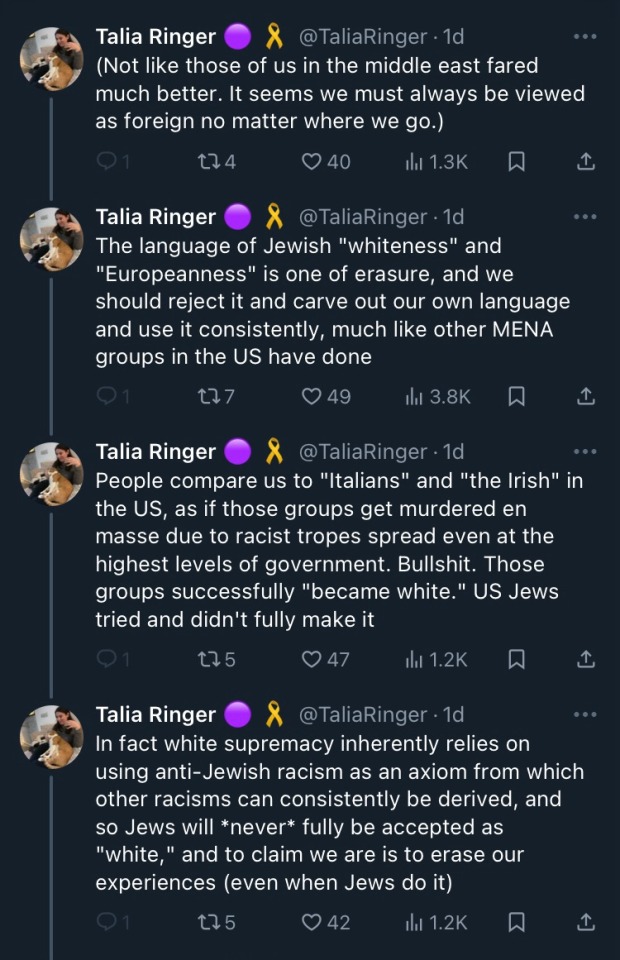
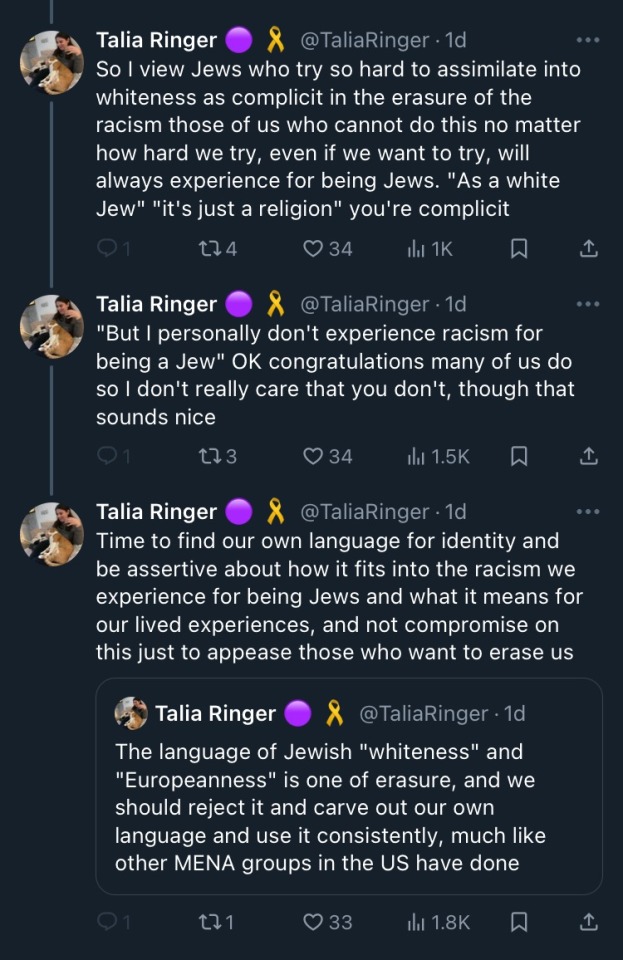
thread
#I will never forget the like week or two weeks of dogpiling I got from christian devyne & his followers for making exactly this point#and the fact that a) it wasn’t too long after I got brigaded by transphobes after it was revealed that one school shooter was trans#and b) that the harassment from leftists was more difficult to get through#antisemitism#judaism#jewish#jumblr#erasure#intersectionality
472 notes
·
View notes
Text
my long overdue intro post
I post mostly about Jewish stuff, including antisemitism and Israel. Occasionally other things. Didn't mean to, just sort of spiraled.
Waiting for my Jewish space laser.
Goyim welcome but may be perplexed.
About me (not Judaism/Israel related)
She/they. Autistic. Neurodivergent. Sadly, American. Anxious. Not good at deciding things.
About me (Judaism/Israel related)
Zionist, in the sense of "Jews should have a state roughly where it is now with undefined borders". Ashkenazi. Reform Jew hovering near agnostic/athiest/ignostic. ✡️, obviously. Stands with Israelis; does not stand with Israel's government. Fuck Bibi.
slogans & such
bring them home now. am yisrael chai! we will dance again. we will outlive them.
woman, life, freedom / زن، زندگی، آزادی. biji kurdistan.
nothing about us without us. healthcare is a human right.
childless cat lady. black lives matter. believe women. defund the police. protect trans kids.
We are the 99 percent. (hummed) look for the union label
slava ukraini!
free uyghurs. free rohingya. free everyone.
Other people's good posts
Oh shit, how did I forget to add this one? Crucial context on Israel, Palestine, Judaism, etc.
https://www.tumblr.com/the-library-alcove/768325306084999168/so-a-while-back-a-fairly-left-wing-friend-of-mine: Left-wing Shoah denial
https://www.tumblr.com/greco-roman-jewess/773850159100624896/being-a-jew-studying-preholocaust-european-jewish: We got the bad ending
https://www.tumblr.com/a-very-tired-jew/778463277637304320: Columbia University antisemitism report
https://www.tumblr.com/unsolicited-opinions/777853546362290176: They went to Israel because it's all there was; musings on Zionism, Israel, etc
https://www.tumblr.com/fromchaostocosmos/778198867204325376/could-you-please-explain-to-me-how-and-why-exactly: gender roles in Judaism, particularly for Jewish men
https://www.tumblr.com/pagecommando/783227247604744192: jews as a rorscharch test
https://www.tumblr.com/odakota-rose/738887554804383744/people-with-low-spoons-someone-just-recommended: The -- free! -- "Sad Bastard Cookbook". Despite the name it's also great if you have other reasons for low spoons (or executive dysfunction)
https://www.tumblr.com/self-care-club/757577148611674112/alexithymia-sucks-this-chart-helps: Fun fact: ~10 percent of people have alexithymia! If you're one of them, try this. It's hard to pinpoint the exact thing but it can get you a vague word. Sadly it doesn't do much for poor interoception (or the fact that Google's dictionary apparently doesn't recognize the word interoception), but it's a start!
https://www.tumblr.com/swarm-of-bees-in-a-trenchcoat/758045266151653376/dealing-with-executive-dysfunction-a-masterpost Executive dysfunction masterpost
https://www.tumblr.com/the-library-alcove/785513502869798912: Hamasnik bingo card, with explanations.
https://www.tumblr.com/unsolicited-opinions/785898041533153280/major-armed-conflicts-between-hamas-and-israel: How intersectionality got twisted into something it wasn't supposed to be
Sideblogs:
@zionism-is-antisemitism, @zionism--is--antisemitism, @zionismisantisemitism: to keep antisemites from getting to it, I don't plan on posting much/at all.
@not-at-all-antisemitic: Haven't quite figured this one out yet. Maybe it'll be an archive.
Procedures & clarfications:
Names of antisemites might not be censored. Depends on my mood.
Many posts will be archived on my end (eg with screenshots)
I may direct you to/quote older posts. If you don't want that to happen, maybe be originally antisemitic.
Genuine questions about Judaism, Israel, etc are welcome! I leave it to you to know if it's genuine.
I will try to flag posts with trigger warnings etc but I may miss some.
If you say something where you are clearly using a dogwhistle for Jew, I will reply as if you said Jew.
Common pitfalls in ad hominems
To save you the trouble of embarrassingly referring to me as one thing only to be informed I am another, here are some not-really-negative things you can slander me with and some common pitfalls when you are ad homineming me.
I:
am Zionist
am Jewish
American, unfortunately. (Emigrating is hard for disabled people, most countries with actual healthcare systems won't accept me and for some reason I don't think making aliyah will make them shut up?)
stand with Israel (mostly)
I am not:
Israeli (or other implications, such as being an Israeli citizen, having any extra influence on Israeli politics, etc). I have never been to Israel.
a Khazar
a Nazi (well, I suppose I might be...as usual, I'd like a definition of how I have in any way, shape, or form expressed support or tolerance of the actions or ideology of the Nazis)
In Memory
Update, February 20, 2025: Kfir, Ariel, and Shiri Bibas are dead.
Kfir was nine months when he was kidnapped. Depending on how old he was when he died, he may have spent most of his life in captivity. He was a baby who had an infectious laugh and had just started crawling. He was always smiling. He didn't even have teeth yet.
Ariel was four, maybe five. He was full of energy and liked Batman, toy cars and tractors, and "anything with wheels and a motor".
Shiri was in her thirties. Her name meant "my song". There's something poetic about that, somewhere.
Even-Longer-Overdue Changelog
Watch me fail to update this when I make changes.
June 19, 2025: We will outlive them.
June 9, 2025 (dang I did not realize how often I update this): Added intersectionality thing
June 6, 2025: Deleted international politics; added hamasnik bingo card
May 22, 2025: Added the crucial context post
May 12, 2025: executive dysfunction masterpost added. will forget about it because i have bad executive function; jews as rorscarch test or however the fuck you spell it
May 8, 2025: Added international politics section; moved Kfir/Shiri/Ariel memorial to the end; added slogans; changed introduction.
April 2, 2025: Added Sad Bastard Cookbook and alexithymia chart, minor formatting changes, created this changelog.
(Retroactive) Feb. 20, 2025: Update on Ariel and Kfir.
(Retroactive) Dec. 17, 2024 -- Created this post
12 notes
·
View notes
Note
Appreciate the input, patience, and visual
Not gonna mince words on the sourcing issue since it’s a moot point although your dismissal of tl something’s validity because it’s associated with AI is… concerning.
I find your pivot to the myth about pedophelia within Jewish spaces curious given how I’m acutely aware of that accusation as a queer AMAB and find that piece of intersectionality crucial in identifying where “hey, my in group might actually need a reality check because we are so divorced from reality it’s AFFECTING people”
Here’s more of what I mean:
The OG convo stemmed from circumcision and has now largely evolved (call it goal post shifting or whatever but the crux is still there, I promise) to whether or not the IDF/Israel was the main driver of antisemitism because of how they treat Hasidic Jews.
I ALSO have qualms with that community because they didn’t get vaccinated and still largely congregated during COVID which is just… unethical? So I think about that, or what they do to oppress women, or queer people, or their own xenophobia or whatever and then I STILL look at them being anti Israel and have to think “huh, the enemy of my enemy really CAN be my friend” and that’s the point I think most people miss.
I get if the tradition needs to be changed internally because at the end of the day, duh, but also, maybe consider external realities and how that might be a wise consideration. God works in mysterious ways or sumthin’
I did not dismiss its validity because it’s associated with AI, I dismissed its validity because it was associated with AI (which is known to give false information) with no corroborating evidence. If you had been able to link to a non-AI source also saying that you can use quotes when paraphrasing, I would not have dismissed it because the AI said it as well, I only dismissed it because the AI disagreed with multiple other sources. Can you elaborate on why you find that concerning? And I will point out that I also dismissed its validity because the link that you provided did not even say what you were trying to prove.
If you are acutely aware of how accusations of pedophilia can be harmful to the queer AMAB community that you understand how they can be harmful to the Jewish community as well. And if you are capable of understanding that, then you are capable of understanding that those accusations come largely from goyim who are obsessed with circumcision, as you are. That means that you’re either not as understanding as you claim to be, or you don’t care that your words can and will be used to hurt us. I’m inclined to believe both.
You make it hard for anyone who isn’t us to track this conversation by responding with new asks instead of reblogging with a reply. This is a shitty tactic to allow you to make false claims about what was discussed previously, and I’m not having it. So to be clear, our conversation started with you asking about my definition of Zionism, followed by you asking for clarification on self determination. You then moved on to asking about giving Gaza back, and solidarity between Jews and other ethnic minorities (which to be fair, I misinterpreted as being about ethnic minorities within Judaism).
But then things started getting weird. Your next ask was primarily a push back on my saying that some of the countries surrounding Israel have 0 Jews in their population by citing completely unrelated things, and a claim on Kabbalah, which your white ass has no right to. Your follow up to that included telling me that quotes can be used for paraphrasing, incorrect information on Kabbalah (still claiming you can play with something from a closed religion), assigning me a race, accusations of Jews being anti-feminist and anti-gay, and accusations that I’m “yucking your yum” when I tell you that Judaism is a semi-closed religion and you can’t just take stuff from it.
You continued on in your next ask by saying that you had a “complex claim to a lot of religions”, accused Israel of being a settler colonial state, accused Jews of trolling and homophobia because you can’t find a rabbi who is willing to convert you, wrote the tetragrammaton (a big no when interacting with Jews) and only here do you bring circumcision into the conversation.
So, no, that’s not by any means the “OG convo.” Also, that was yesterday, the conversation has not “evolved” since then. You did make one more ask between that one and this one and you do mention the IDF, but the IDF/Israel as the main driver of antisemitism is literally a concept you’re introducing here for the first time in this conversation.
So at this point, you’re just using these asks to put antisemitic talking points in my inbox, and I’m tired of it. I’m tired of you trying to manipulate my words into something they’re not. I’m tired of you outright lying about the course of the conversation so far. I’m tired of your entitlement toward my culture. And I’m tired of trying to have a conversation with an antisemite.
Enjoy reading this as an email because I’m about to disappear from your tumblr.
#asks and answers#antisemitism#I have a lot of patience to have conversations with antisemites#a lot of them don't know and benefit from education#even in the last year there have been a handful of people that I've managed to reach#even if that's not what happens most of the time I think that it's still worth it to try#but I can't have a conversation with someone who is claiming we're having a different conversation than the one I'm experiencing#especially when I'm pretty sure they're doing it maliciously#get blocked#judenhasshole
4 notes
·
View notes
Text
Mmmm I see a lot of interesting tags as people start following me for posting about being Native and Jewish when I discuss the intersectionality of these things.
So I'm just gonna. Like. Say my stance, because some of y'all are (potentially) really pushing some hardcore with some shit that goes directly against what I said in those posts.
Palestine is suffering through genocide and ethnic cleansing, as defined by the UN. Genocide is defined as "the following acts committed with intent to destroy, in whole or in part... killing members of a group, causing serious harm to a group, deliberately inflicting on the group conditions of life calculated to bring about its destruction in whole or in part" (alongside measures that impact children and limit the future of said group). That is a non-negotiable fact.
Hamas is a terrorist group. Terrorism is defined based only upon whether or not civilians are targeted. In this, plenty of nations and revolutionary groups easily fall under the label of terrorism. Hamas is not special in this regard. They are not decolonizing, and to say so is a major slap in the face to decolonial efforts.
*I would also add that Israel, by definition, also employs terrorist tactics, and could therefore be considered a terrorist nation. They do target civilians, and that's literally all terrorism as a tactic is. Terrorism becomes a moot point when both sides do the same thing to each other.
*I would to do a whole aside into the binary belief that's been pushed recently that decolonization must be violent because colonization is violent: this is inherently harmful and reductionist, because it demands that an oppressed group must act in the same way as their oppressors for freedom. Fuck that.
Israel as a modern day nation is built on the methodology and structure of settler-colonialism. Settler-colonialism is not a Western, European, or White concept: it is only related to Western, European, and White identity because it has been perpetuated the most by these (overlapping) groups. It was also literally stated by people who pushed the Zionist Movement (Herzl) that Israel as a modern nation would be a settler-colonial state. This can be considered what China has done to Tibet, or what Japan did during WW2.
The reason I say it is a settler-colonial methodology and structure, as opposed to the other definition that it must be a foreign entity taking over an indigenous entity as noted in the examples above (and this is why people need to agree on how they use terminology, because these kinds of words may have different definitions that can completely change your meaning), is because Jewish people are not foreign, they are indigenous. Judaism is directly tied to the land in multiple layered ways; you cannot separate it, even in diaspora.
*As a side note, this also applies to Zionism itself: it is a concept and a movement in which definitions may have some similarities but are very different. Zionism as a concept can mean two things (potentially three, but let's stick with two) from my understanding: seeing Jewish people in diaspora as their own autonomous group, similar to how Natives have tribal sovereignty - or simply meaning Jewish people have the right to return to the land they were forced into diaspora from in some way, potentially much like the Native Land Back movement where this does not necessarily mean completely taking over the land itself, but having access to it. Zionism as a movement is what created Israel as a modern nation state through the methodology and structure of settler-colonialism. To me, Israel may have originated as a promise for this, but it is not how to go about this; Israel is Not Okay in how it's going about this, and is no longer representative of Zionism in that regard (if it ever was to begin with, because Settler Colonialism is wrong; there are other ways to achieve what Zionism as a concept aimed for, and a Settler Colonial Nation State is Not It). Learning to understand how the term is being used is incredibly important, because it is not a one definition term, same as settler-colonialism.
So here's a fun fact that involves all these points: oppressed minorities that experience colonization and genocide are not immune to committing colonization and genocide against others - this is literally something any group can do to another group if they have resources to do it. This happened during the Rwandan Genocide, this happened during the Cambodian Genocide, this happens even today with plenty of other nonWestern, nonEuropean, nonWhite groups towards other nonWestern, nonEuropean, nonWhite groups. This is not specially reserved for only people within power against people without power. In fact, it's one of the remaining vestiges of leveraging what's left of Western, European, White imperialism: pitting oppressed minorities against each other to extract resources and influence by perpetuating conflict.
Why else is the US so involved in this conflict? Why else are so many nations engaged with trying to benefit from a zero-sum game where one side can be a sole victor instead of trying to work out other options? (Especially when people living through this have done and are doing the work of building bridges to support each other?)
Anyway. Palestine deserves to be its own nation once more. Zionism as a concept is something I support because Jewish people were forced into diaspora and forced from the land they are connected to. Realistically, Israel isn't going anywhere, but allowing a nation to actively and openly commit genocide and ethnic cleansing is horrific and terrible, and should never be supported.
These are all things that can coexist, and if you cannot comprehend that or disagree, potentially due to lack of understanding (which I find disappointing, as that implies a refusal to use terms correctly simply because they do not jive with the argument you want to center) or emotional reactionism (which I find completely fair, as this is a traumatic issue and affinity grouping is sometimes necessary for mental health), I would suggest unfollowing me.
At any rate, as I've said before: support Palestine without shoveling antisemitic propaganda by decentering the actual issues or erasing actual support. That's all.
17 notes
·
View notes
Text
Dear World: I Don't Care
by Avi Lewis
I don’t care that you sympathize with Hamas
I know you wouldn’t tolerate any of the things they did to us if they would’ve done it to you
I don’t care that you’re outraged by Israel’s response to the massacre more than the massacre itself
I know you would do everything to eliminate such pure evil if you experienced it yourself
I don’t care that this doesn’t fit neatly into your carefully constructed narrative of ‘Israel as aggressor’ and ‘Palestinian as victim’
The truth hurts sometimes, but hey, don’t let facts get in the way of your feelings
I don’t care if you think we are at fault, that we had it coming, that Hamas’ actions’ didn’t occur in a vacuum (or to deny they ever happened)
If you feel that the poster of a kidnapped child hurts your cause, maybe yours is a lost cause
I don’t care about your calls for a premature ceasefire, about your demand that we provide them with electricity, that we stop fighting for ‘humanitarian reasons’
What of a humanitarian gesture to release our 230+ hostages – elderly, children, babies – snatched from their cribs?
I don’t care that you’ve rallied for Palestine as part of your march for LGBTQ rights, trans rights, workers rights, socialism, climate change, intersectionality, Black Lives Matter, fighting Islamaphobia and ‘all forms of racism’
Your gullibility would be laughable if it wasn’t so hypocritical. None of those things exist under Hamas
I don’t care that you ‘love Jewish people – just hate Israel’, that you have some friends that are Jewish, that maybe you’re ethnically Jewish yourself – and therefore you’re entitled to levy every libel in the playbook against us
Words matter. They lead to actions. When a lie is repeated often enough it’s accepted as truth. You are laying the groundwork for more attacks against us
I don’t care that you wave the flag of ‘human rights’, that you’ve become overnight experts in international law, that you shout fancy slogans you don’t understand such as proportionality, occupation and apartheid
Your humanity is selective. In your mind, human rights don’t apply to us because we are undeserving. You didn’t speak up when our women and children were horribly assaulted
I don’t care if you think we are colonialists, imperialists and settlers and that we should just go back to where we came from
We are back to where we came from
I don’t care if you believe in a one state solution, a two state solution, a federation, an internationalized Jerusalem or any other theory drawn up in your ivory tower
We won’t readily hold out our necks and endanger our lives in order to satisfy your thought experiments and placate your conscience from afar
I don’t care if you consider yourself anti-Zionist but not antisemitic
We’ve seen enough Jews around the world attacked over the last 3 weeks under the guise of ‘anti-Zionism’
I don’t care that you think we are too powerful, too technologically advanced, too sophisticated
If we didn’t build ourselves up to this point we’d get eaten alive by Hezbollah, Islamic Jihad, Iran and Palestinian terrorism
I don’t care that you blame us for 1948 refugees, for the fact that they have no state, for the keys that they wave in their fantasy of ‘right of return’
Three weeks ago we got a glimpse of what that ‘return’ looks like and what it means for our children
I don’t care if you think we aren’t real Jews, that Zionism has nothing to do with Judaism, that Jews are a religion and not a nationality and so we deserve no state
Your denials have zero impact on the strength of our ideals and the self-affirmation of our identity
I don’t care that you accuse us of flaunting the myriad of UN resolutions, inquiries and statements
They reflect more on the institutional decay of the UN than on us
I don’t care about your media coverage, the lies, the equivocation, the acceptance of Hamas talking points and statistics
You echo chamber is just a another weapon in their strategic arsenal
I don’t care that you accused us of bombing the Al Ahli hospital
It was only a matter of time before you found a symbol for Israel’s wickedness. The subsequent retractions were a fig leaf once the truth emerged that Islamic Jihad was responsible and that the hospital is still standing
I don’t care that you see us as a criminal state, a terror state, usurpers, baby killers, Christ killers, Khaybar Jews or any other depravity that exists in your mind
Your libels lay the groundwork for our dehumanization. Rings a bell. We will fight it
I don’t care that you’ve inverted the truth by accusing us of genocide
If positions were reversed and Hamas held the power we do now, you’d see what a genocide looks like
I don’t care that you’re angry, boiling and outraged
I don’t care that you’re glued to your TV screens and Telegram channels
I don’t care that you’re mad
I don’t care if you’re out on the street, waving your flag and chanting your slogans
We won’t die silently the way you want us to
For the first time in 2,000 years we are organized, we are motivated and we will defend ourselves
We fight for light over darkness
Morality over evil
Not that it matters to you – but we will stick to the rules and hold the high moral ground not because you expect it from us, but because they are a value for us
We will do so ethically and thoughtfully, for we are the People of the Book
Our power and strength are our necessity, because the alternative for us is:
Be’eri, Kfar Aza, Pittsburgh, Toulouse, Farhud, Hebron, Birkenau, Belzec, Babi Yar, Kristalnacht, Kielce and Kishinev
Do you think for a moment that we would return to that reality just to make you feel a little better?
You are deeply mistaken…
World,
For so, so long, I really, deeply cared
I cared about fitting in
I cared about what you think
I cared about being a model citizen
I cared about setting a personal example of how a tiny people in a tough neighborhood could still be a Light unto the Nations
How the world’s oldest minority – now a majority here – could treat its own internal minorities par excellence amidst the complicated and messy reality of ethnic conflict
How we could painfully dismember parts of our homeland and offer them on the platter of peace to Palestinians that want neither peace nor some parts (they want all of it)
How we could dazzle you with USB sticks, drip irrigation, operating system kernels, Nobel Prize winners, swallowable medical cameras, deep tech, quantum mechanics, generative AI and cures for disease
But now I’m finally accepting that you don’t care
You never did
You don’t see and you don’t hear
And because I cared about what you think so much, that so deeply hurts
But you don’t have my best interests at heart
You take issue with my base identity, with what I represent
Don’t expect me to wait for your approval this time
It doesn’t matter what I do, you’re not going to change
It doesn’t matter how I act, because your issue is with who I am
Now I’m going to block out your noise, and do what it takes to win this war
Today
Finally
I no longer care
10 notes
·
View notes
Text
How is this much of piss on the poor moment on both sides have posted today and in 2015 when intersectionality was seen as min maxxing and people fell for psyops and fake stories
obviously you can talk to Jews, this isn’t the bad times when you are legally forbidden to speak to jews, but the way you phrased it sounded to my friend as if you were appropriating Judaism in your Wicca because it seemed ‘cool’ and not merely being his Shabbos goy.
“In Jewish thought, a sin is not an offense against God, an act of disobedience. A sin is a missed opportunity to act humanly. The verb to sin in Hebrew is also used in the sense of ‘missing the target.’ When God created us free to choose between good and bad, He also gave us the capacity to know when we had chosen wrongly”
— Harold Kushner, To Life!: A Celebration of Jewish Being and Thinking
23K notes
·
View notes
Text
Whatever episteme tumblr created about race and intersectionality is completely unable to theorize about antisemitism in a satisfactory way. The toothpaste-flag Kahanists are talking about how Christianity is cultural appropriation and how Arab Americans got way too comfortable after 9/11 and were coddled and just blah blah blah. The consensus they endorse is the most ridiculous conception of race theory that tries to pit Jews as a coherent generality of strange asiatics who are threatened by police regimes in the U.S. and “Islamists” abroad. The idea that Ashkenazi Jews are threatened by some suffuse WASP culture of casual antisemitism is patently absurd in 2024, especially the idea that it leads to regime violence, and they want “Islamist” to mean Islamic fundamentalism but clearly don’t.
I don’t usually post about these people because the important thing is the conflict, there is no point in debunking them because that work was done 20-30 years ago by anti-Zionist historians, and these people are fundamentally pathetic to both their enemies and allies, but holy shit these people are disgusting and use their Judaism to completely instrumental ends.
0 notes
Text
I know it's hard to do so when you've dedicated so much time to leftist movements and found a community that's helped you and some others thrive, but you HAVE to criticize the left when it is failing groups of people. And it is 100000000% failing Jews.
Almost every single non-Jewish activist who usually posts about tragedies when they happen to numerous other marginalized groups has remained silent about the recent news about the Bibas family. Most have been entirely silent about October 7th. Even this post will likely be reblogged/liked by 95% Jews.
All your Jewish friends could have been born Israeli. It's entirely dependent on where their ancestors fled to. Half of the world's ENTIRE Jewish population lives in Israel. And you- no matter what group you belong to- could have been born Israeli. You might be in denial about it, but it's true. Anyone of us could have been born anywhere.
I roll my eyes when "I'd totally punch a nazi!" activists complain about Elon Musk maybe doing a nazi salute, yet never post about what Jews have been mourning for over a year now. Their words are empty. Elon is easy to criticize because he is a douchebag who is rightfully hated by the left. You risk no real social consequences for your posts about him. You are not a social justice advocate- you are a coward.
But what kind of world are we living in where anyone in any movement claiming to be about "justice" feels they are risking social consequences for posting about Jews who were murdered due to being Jews? Fearing your "comrades" scolding you for posting against antisemitism? They have some big antisemitism problems to deal with. Are you willing to confront them about it?
Fearing social consequences for speaking up about suffering Palestinians and suffering Israelis are two sides of the same coin of extremism. I always wonder if my posts really get through to anyone, or if I'm mostly screaming into the void. Will this post affect you? Or will you just go "ah that's kinda sad idk" and move on?
It's time to have some tough conversations with people you might be afraid to get into them with. Are you going to be a true ally to Jews or not? Are you going to fix your activist spaces to be ones centered around the principles of justice and equality? Or are you going to ignore it and claim you're not antisemitic? Because Jews have seen where indifference and denial leads to before. Spoiler alert: it's horrific.
#social justice#jew#jewish#jumblr#jews#judaism#antisemitism#antisemitic#left#leftist#liberal#social commentary#activism#activist#October 7#israel#hamas#justice#bibas family#shiri bibas#kfir bibas#yarden bibas#ariel bibas#middle east#injustice#intersectionality#empathy
896 notes
·
View notes